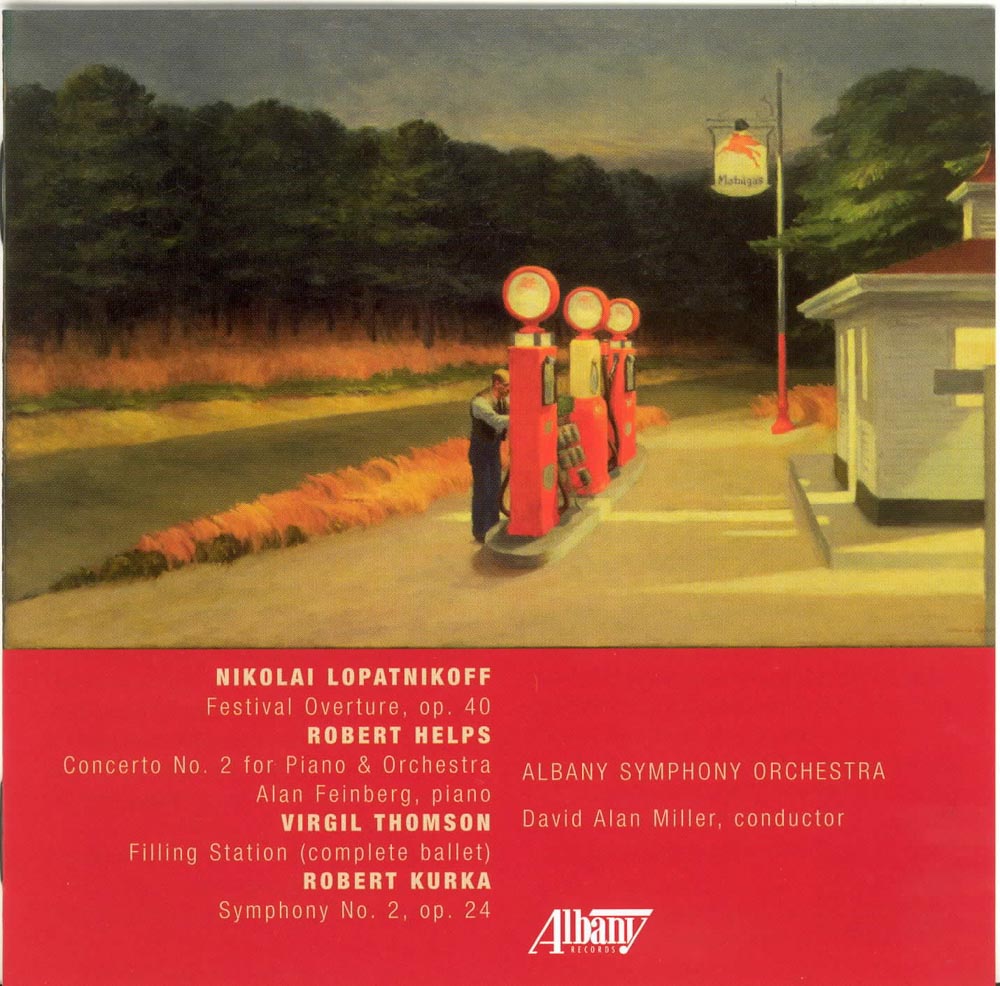Helps, Thomson, Lopatnikoff, Kurka: Orchestral Music
Alan Feinberg (piano), Albany Symphony Orchestra, David Alan Miller (conductor)
A self-declared adversary of what he termed "the danger of academicism and dogmatism in the musical arts," Nikolai Lopatnikoff came to the United States in 1939 by way of England, Germany, Finland, Russian and Estonia where he was born. He taught at the Hartt College of Music and Westchester Conservatory in upstate New York before settling at the Carnegie Institute in Pittsburgh. His compositions - including four symphonies, various orchestral pieces, the opera Danton and the ballet Melting Pot - were known for their melodic strength and aggressive, racy drive. That Lopatnikoff counted the melodist Borodin and the rhythmically demonic Hindemith among his early influences is no surprise. His Festival Overture was commissioned by the Pittsburgh Plate Glass Company and was dedicated to the "automobile industry of America." Born in Passaic, New Jersey, Robert Helps graduated from the Juilliard School and did postgraduate work at Columbia University and the University of California. His composition teachers included Roger Sessions and Milton Babbitt. He taught piano at Berkeley, the San Francisco Conservatory, the New England Conservatory and the Manhattan School of Music. "In a country as big as ours," says Pulitzer Prize-winning composer John Harbison, referring to his friend and one-time piano teacher, the late Robert Helps, "there are many hidden first-class artists." Just as Virgil Thomson's Four Saints was a landmark opera, his Filling Station was a ground breaking ballet - the first to showcase an American choreographer (Lew Christensen), an American dance company (American Ballet Caravan, precursor to the New York City Ballet), and American designer (the infamous painter Paul Cadmus) and a down-to-earth American setting (a gas station) - all bound up with Thomson's mock-grandiose and pop inspired music. Filling Station premiered on January 6, 1938 at the Avery Memorial Theater in Hartford, Connecticut. The version performed on this SACD is the entire ballet, uncut. "There is a degree of freshness and impetuosity that defines Kurka as an imitator of nobody. It must stand as the insufficient summation of a talent that was only beginning to find itself when Kurka died in the fall of 1957." Thus read the Saturday Review's critique of the 1959 Carnegie Hall premiere of Robert Kurka's Second Symphony. Kurka's promising career ended abruptly when he died of leukemia at the age of 35. He was born in Illinois and received his music degrees from Columbia University. Although described as largely self-taught, he did study composition briefly with Darius Milhaud and Otto Luening. He himself taught at the City College of New York, Queens College and Dartmouth. On the premiere performance of the Symphony No. 2 on July 9, 1958, the San Diego Evening Tribune reported, "It swells with the teeming rush of the metropolis. Kurka's Symphony is mindful of the best traditions of the 19th century. Everyone who has heard this wonderful work has enjoyed it and now it is your turn.
Track Listing
| Title | Composer | Performer |
|---|---|---|
| Festival Orchestra | Nikolai Lopatnikoff | Albany Symphony Orchestra, David Alan Miller, conductor |
| Concerto No. 2 for Piano & Orchestra | Robert Helps | Albany Symphony Orchestra, David Alan Miller, conductor, Alan Feinberg, piano |
| Symphony No. 2, Op. 24 | Robert Kurka | Albany Symphony Orchestra, David Alan Miller, conductor |
| Filling Station | Virgil Thomson | Albany Symphony Orchestra, David Alan Miller, conductor |
Reviews
- “
"...these works receive a smashing performance from a clearly energized Albany Symphony..."
- “
"...an eventful and satisfying journey."
*Album cover provided for Editorial use only. ©Albany Records. The Albany Imprint is a registered trademark of PARMA Recordings LLC. The views and opinions expressed in this media are those of the artist and do not necessarily represent or reflect the views and opinions held by PARMA Recordings LLC and its label imprints, subsidiaries, and affiliates.

